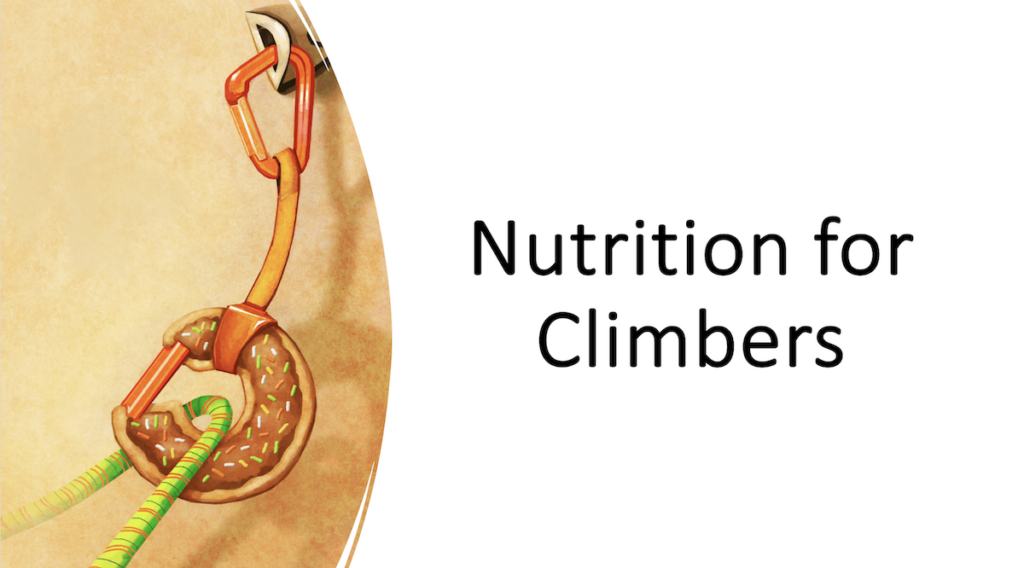
Welcome to the basics! As a climber, you need a balance of fats, carbohydrates, and protein to help your body function at its best, prevent injury, and optimize recovery. While this post may seem basic to some, it’s the foundation of many body processes and is useful to understand!
There are a lot of nutrition myths and misinformation out there. Understanding what is true about how your body uses different nutrients can help set you up for success.
Energy
Food provides energy for your body. Adequate energy is essential for your body to have the resources it needs to function. Your body uses this energy to maintain normal body processes, such as heart rate, breathing, producing new cells to maintain tissues, digestion, and more.
Energy in food is measured in calories or kilojoules. Your body needs a certain amount of baseline calories to exist, and then you need additional calories to do whatever else you want your body to do. Working, daily household tasks, exercising, and even thinking require extra calories. Getting the right amount to support your body will help you be healthy.
Energy needs vary from person to person based on their gender, age, body composition, and activity level. They also vary if you are stressed, injured, or sick. Energy needs also fluctuate from day to day or week to week—they aren’t always exact or static.
Macronutrients are nutrients that provide energy. These are carbohydrate, protein, fat, and alcohol. Let’s take a look at each one.
Carbohydrate
Role in the body: Many popular diets eliminate or limit carbohydrates (or carbs), but carbohydrates an important macronutrient for sports performance. Whether you are climbing, skiing, hiking, lifting weights, or anything else, your body needs carbohydrates to fuel those movements.
Carbohydrate is the fuel in the anaerobic energy system and the aerobic energy systems. If you are doing a moderate-paced endurance exercise, your body is using a mix of both carbohydrates and fat to fuel that workout. If you are doing an intense move, such as a sprint or power lift, your body uses carbohydrate to fuel that movement. Carbohydrate provides four calories per gram.
The food you eat, including carbohydrates, also keep your blood sugar regulated and provide fuel for your brain. Glucose is a form of simple sugar (carbohydrate) in your blood. It serves as fuel for your cells and brain. Your body likes to keep blood sugar levels regular so you can feel optimal and perform your best.
Glycogen in a storage form of glucose. It is stored in your body in your liver and skeletal muscles. Glycogen helps keep your blood sugar stable by breaking down into glucose when you are sleeping or fasting. It also is on-board fuel in your muscles to power any muscle contractions.
Most people have around 1200-1400 calories of glycogen in their muscles and liver. If you exercise for about two to three hours without eating any food or drinking any fluids that provide calories and carbohydrates, you can run out of fuel and “bonk.” This is common in endurance evens such as marathons and triathlon, as well as cross country skiing or all-day adventures.
Bonking simply means your body runs out of fuel to power your exercise. Symptoms include feeling weak, shaky, and lethargic, with heavy legs and fatigue. You can prevent bonking by eating regularly, about 30-60 grams of quickly-digestible carbohydrate per hour (such as a white bagel, gummies/chews, juice, honey, or sports drink, or even up to 90 grams per hour for long endurance events. You can recover from bonking by stopping your exercise, eating quickly-digestible carbohydrate, and waiting about 20-30 minutes for your blood sugar to come back to normal.
There are no “good” or “bad” carbs. They are simply fuel for your body. Some carbohydrates, such as fruits and whole grains, contain vitamins, minerals, and fiber, which makes them a good choice for overall health. Others, such as fruit juice and gummy candy, do not have useful nutrients other than the carbohydrate itself—but they are very useful in certain situations.
Eating regular meals help regulate blood sugar. Eating before exercise if it’s been more than two to four hours since your last meal can help you feel fueled and energized for the workout.
Food sources: Main food sources of carbohydrate include:
- Grains: rice, bread, pasta, oats, barley, cereal, etc.
- Fruit and fruit juice
- Starchy vegetables: potatoes, yams, sweet potatoes, squash, corn, peas
- Legumes and lentils: kidney beans, garbanzo beans, lima beans, etc.
- Sweets and desserts: candies, cookies, cake, soda (not diet)
- Milk and yogurt
Recommended intake
Your carbohydrate needs may vary depending on your activity level. The baseline carbohydrate needs for normal healthy adults is around three to five grams per kilogram per day. If you are doing heavy training or have a long day of hiking, skiing, or climbing, you will need more carbohydrate, up to 7-12 grams per kilogram per day.
Protein
Role in the body: Protein plays a number of different roles in the body. It’s an incredibly important nutrient for overall health and also sports performance. It’s involved with muscle growth and repair, bone health, immune function, tendon and ligament health, skin, and all organs.
Protein is made up of amino acids, which are like building blocks for protein. Some amino acids are not essential, meaning your body can manufacture them on its own. Some are essential, which means you need to get them in your diet in order for your body to operate at optimal health. Protein provides four calories per gram.
Eating a wide variety of foods usually supplies enough overall protein and amino acids to be healthy. Those at risk for not getting enough protein are vegans, vegetarians, and people that are dieting or restricting their food intake.
Protein also helps people feel full and satisfied after a meal. Adequate protein is needed to help preserve lean muscle mass when trying to lose weight.
It is a crucial nutrient for athletes. Whether you are a climber, skier, hiker, alpinist, runner or anything else, your body needs enough protein to perform optimally.
Food sources:
- Meat, fish, poultry
- Eggs
- Dairy products (milk, yogurt, cheese)
- Legumes (beans and lentils)
- Nuts and seeds
- Whole grains
- Soy products (tofu, tempeh, edamame)
In general, proteins from animal sources, such as eggs, meat, fish, poultry, and dairy products are better absorbed and used in your body than protein from plant sources (like tofu, beans, lentils, and nuts).
Protein from whole food sources offer a variety of nutrients, as well as fiber if it is from a plant source. This is usually better than using a supplement such as a protein powder, although in some cases protein powders can be useful.
Recommended intake:
The recommended amount of protein you may need varies widely based on your individual health history and your current exercise program. The minimum requirement in most countries is around 0.8 grams per kilogram per day.
Athletes will need much more to function optimally. A strength athlete, or an athlete undergoing a very intense training program may need up to 2.2 grams per kilogram per day, while an endurance athlete with a moderate training program may need around 1.2-1.6 grams per kilogram per day. If you are recovering from a surgery or injury, you may also have increased protein needs, from about 1.3-2.0 grams per kilogram per day.
Find a qualified dietitian to help you determine your own calorie, protein, and carbohydrate needs for your particular situation.
Fat
Fat sometimes has a bad reputation, but fat is essential for life. Your body needs fat for absorbing fat-soluble vitamins (vitamins A, D, E, and K). Fat makes up almost all cell membranes in the body. It also provides energy and essential fatty acids your body cannot do without. Fat provides nine calories per gram.
Two main types of fats are saturated and unsaturated. In general, it’s best to get most of your fat as unsaturated, as this is better for overall health and risk for heart disease. Foods like olive oil, fish, nuts, seeds, and avocado provide healthful fats that are beneficial for your body.
Fat also plays a role in energy metabolism. This means that fat can be a fuel source for your exercise and training. Fat is used as a fuel source, along with some carbohydrate, when the body is exercising at a moderate intensity, such as jogging, walking, hiking, or skiing—anything you can do for several minutes to hours.
Food sources:
- Nuts and seeds
- Avocados
- Fish, meat, and poultry
- Eggs
- Olives
- Coconut
- Oils
- Full-fat dairy products, such as butter, yogurt, milk, cheese, and ice cream
- Fried foods, such as French fries, donuts, or breaded fried meat and fish
- Baked goods made with fat, such as biscuits, cake, and cookies
Recommended intake
Most countries recommend limiting your intake to about 60-70 grams of fat per day, with 10% or less of total energy intake as saturated fat, and little to no trans fats.
Alcohol
Alcohol is technically a nutrient, as it provides energy at seven calories per gram. However, it is not recommended to be a large part of your diet, as it is a toxin and also can be very harmful to health, as well as addicting.
Alcohol should be used only in moderation or not at all. Consult with your healthcare professional before using alcohol to ensure it will not interact with any medications or cause harm to your body.
While alcohol is not recommended, it is included here because many people drink it on a regular basis. It’s important to be aware of how it can affect your training. Alcohol can interfere with muscle rebuilding and repair after a training session, decrease concentration, interfere with quality sleep, dehydrate you, and decrease coordination. It can also add additional unwanted calories that your body may not need, and thwart your ability to eat a good meal if you are drinking instead of eating.
With the right balance of macronutrients, and variety of food in your diet, you can feel better and climb harder.

Want to learn more? Check our our on-demand course or our book, Nutrition for Climbers: Fuel for the Send.
~This is general nutrition information and not medical or nutrition advice. Always consult with a healthcare professional before undergoing any diet or lifestyle change.
